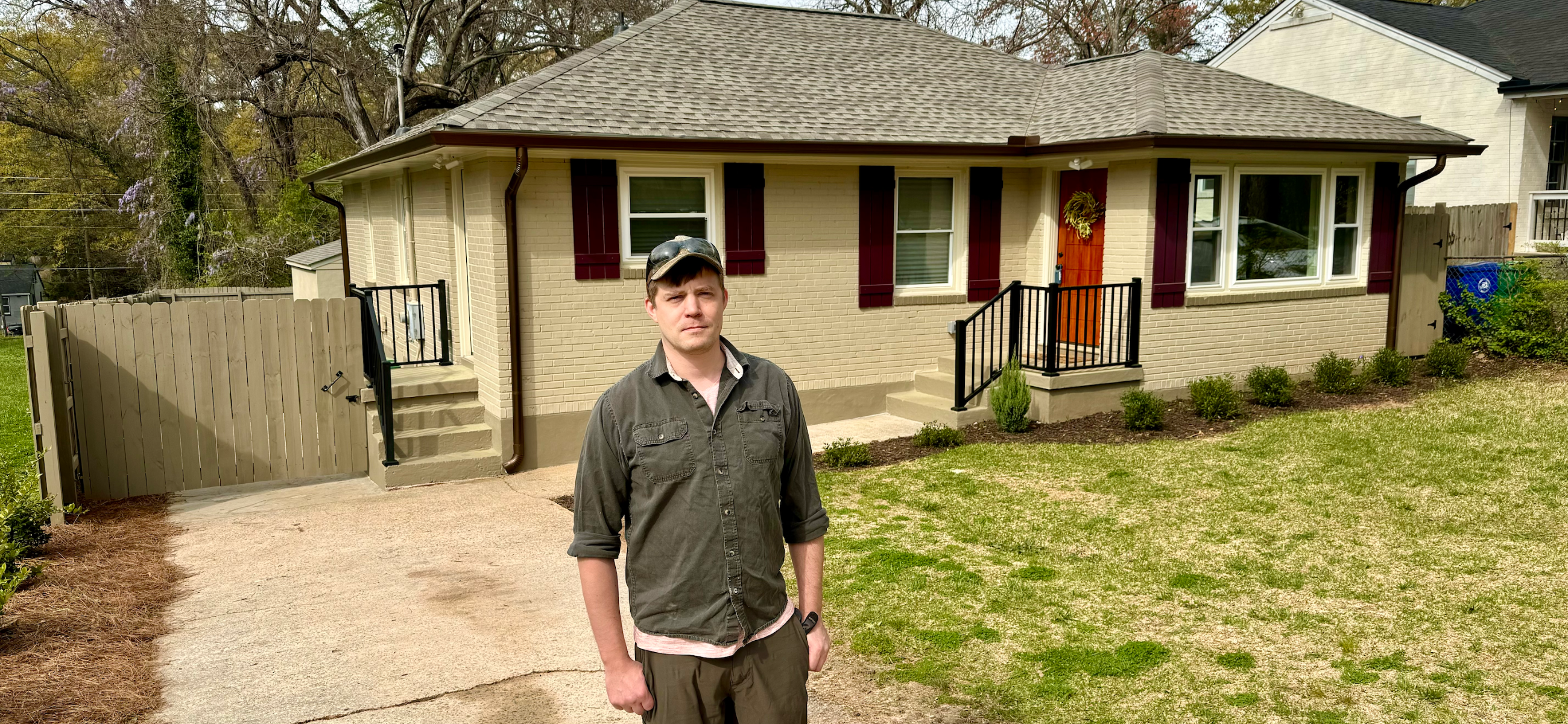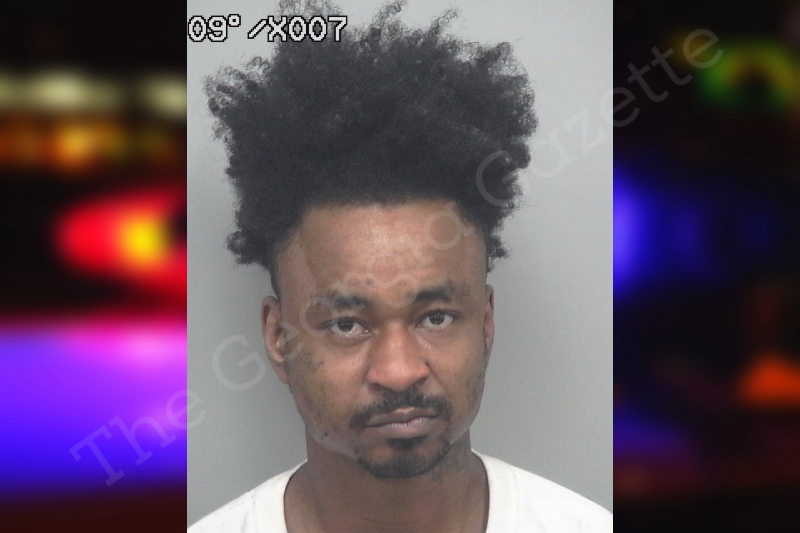Stay ahead of the curve as a political insider with deep policy analysis, daily briefings and policy-shaping tools.
Request a DemoHarried homeowners relieved to see bill criminalizing squatting

Tim Arko stands in front of the property he formerly owned in south Dekalb County where trespassers stayed for seven months in 2023 while he pursued legal remedies to get them evicted. Arko said he lost about $100,000 in unpaid rent, attorneys fees and diminished resale value of his home, which was damaged by the squatters. It has since been sold, repaired and renovated. (Credit: Jill Jordan Sieder)
ATLANTA — A bill passed by the General Assembly last week would make squatting a misdemeanor criminal offense, punishable by up to a year in jail, a $1,000 fine, or both.
Squatters who forge fake leases could be charged with a felony. And judges can impose more fines based on the fair market value of rent that landlords lose. Unlawful squatting is entering and residing on the land or premises of another without the knowledge or consent of the owner.
The Georgia Squatter Reform Act would also speed up the legal process by which such intruders are removed from a home, which currently can take several months to two years. That’s often because such eviction cases are handled as civil matters in the state’s superior courts, many of which have been backlogged since the pandemic.
The bill would direct local law enforcement to issue citations and arrest people accused of squatting if they don’t provide a valid lease or proof of payment within three days. And it would move evictions involving squatting to magistrate courts, and require cases to be heard within seven business days after filing.
“Currently in Georgia law, we’re giving squatters tenant rights,” said Rep. Devan Seabaugh, R-Marietta, the lead sponsor of the bill, which passed unanimously in both chambers. “And my bill would take that away. It basically says, ‘You’re an intruder, you’re a criminal, and we’re going to treat you like a criminal.’ ”
Who’s the trespasser here?
The bill would become law upon its expected signing by Gov. Brian Kemp, which can’t come soon enough for property owners like Tim Arko, who spent seven months last year trying to remove squatters from his DeKalb County home.
When Arko, 34, went to check on his just-vacated rental house near the East Lake Golf Club in Atlanta last year, he was surprised to find a car in the driveway, air mattresses and several people inside the house, and about a dozen pit bulls in cages in the backyard. When he identified himself as the owner and asked what they were doing there, he said a man told him, “Oh, I’m renting this, I paid my rent, it’s my house now.’ ”
“I said, ‘No, I’ve never met you in my life. I have no idea who you are. If you paid someone rent, you got scammed,’ ” recounted Arko, who at the time co-owned and managed several rental properties. The man flashed a gun at him, and Arko ran away through the backyard, hopped the fence, then drove home.
Things went downhill from there. Arko called 911 and told the dispatcher that people were trespassing on his property. He said the dispatcher told him since he wasn’t in immediate danger, police would check into it when they could, and to stay away from the property. Not satisfied, Arko went back, this time with a rifle. A tense standoff took place, and when DeKalb County police arrived, it was Arko who was arrested, handcuffed and taken to jail.
Arko said while sitting in the back of the police car, he heard police officers apologize to the squatters, who brandished a key to the house and insisted they’d signed a lease with Arko’s sister and paid her 12 months of rent upfront, in cash. Arko does not have a sister.
By day’s end, Arko had been told by police that it was now a civil matter, that he was barred from entering his property, and that he’d have to file an eviction to get the intruders out. That eviction process would run from February to August, and ultimately cost him over $100,000 in lost rent, legal fees and diminished resale value of his home.
After he prevailed in court and was finally able to get back into his house, Arko found holes in the walls, appliances and the air conditioning unit gone, and damaged floors that reeked of marijuana. He said he decided to cut his losses and sold it to a house flipper.

In April 2023, while Arko was still fighting the occupation of his home, two people died from an alleged overdose, according to his next door neighbor, Mackenzie Cullum, who told State Affairs she saw the deceased rolled out of the house in body bags, and “a girl on her knees, screaming and crying.”
One of the people who died was Estercardo Ivory, the 41-year-old man Arko had first encountered at his home, according to DeKalb County Police. Previously charged with a felony in Gwinnett County, Ivory had initially responded to Arko’s dispossessory complaint with this brief answer: “I paid money to live here. I’m a tenant.” It was enough to keep his legal defense alive, but Ivory never made it to court.
Cullum and her partner Catherine Lyle said they regularly witnessed people using and selling drugs on Arko’s property, which became littered with needles and drug bags, as well as beer bottles, mounds of trash, dog poop and burnt-out stoves.
During the seven months that “six familiar faces” and many strangers came and went, some openly carrying guns, Lyle said, “We both didn’t feel safe in our house, in our yard. We also didn’t feel comfortable taking a walk at night. It was a very stressful time.”
Arko said he’s now out of the property management business, and heading back to law school this fall. Learning of the new legislation to punish squatters and expedite their eviction, he said, “Anything would be an improvement. Right now, the cops just call it a civil matter and walk away. They say they can’t do anything about it because they don’t know who to believe. All the burden is placed on the homeowner, which isn’t fair.”
Squatters, squatters everywhere
Over the past year or two, metro Atlanta has become a hotbed for squatters, who are also finding their way into homes across other parts of Georgia, according to many realtors.
A fall 2023 survey of institutional investors in single-family rental homes who are members of the National Rental Home Council found there were 1,200 illegally-occupied homes in and around Atlanta. Of those, 35% were located in Fulton County, 25% in DeKalb County, and 20% in Clayton County.
The council’s CEO David Howard said Atlanta topped all markets with homes occupied by trespassers, followed by Dallas/Fort Worth with 475 and Orange County, Fla. with 125.
“Beyond the obvious property rights issues involved with trespassing, the impact of this kind of activity extends well beyond the concerns of the individual property owner,” said Howard. “There are serious public safety issues at play here: Who is in the home? What is happening in the property? What is the risk to others in the neighborhood?”
And, Howard noted, squatter activity, which can tie up rental properties for months or years, impacts “the availability of affordably-priced housing.”
“Every incident of illegal occupation means there’s one less home available for a family in need of quality, single-family rental housing,” said Howard.
Since 2020, average rent in Atlanta has increased by about $368, or 22%, according to Rent.com. And Zillow reports the median rent for a one-bedroom property in metro Atlanta is now $1,594 and a two-bedroom unit is $2,125. Across Georgia, the average rent for a one-bedroom apartment is $933 and a two-bedroom is $1,120.
“Squatting is a huge problem,” said Betsy Bradfield, advocacy director for the Georgia Association of Realtors, noting that realtors are reporting that squatters have taken over homes for sale and rent all over metro Atlanta, as well as in Albany, Gainesville and Valdosta.
“A lot of our female realtors are especially nervous, and they refuse to show houses alone right now,” said Bradfield. “Other people are starting to get worried and are carrying pepper spray with them. Of course a big problem is that realtors can’t get into some houses, because the squatters have changed the locks and won’t let them in.”
That’s the scenario Albany realtor Nyame Fields faced when she went to check on a property owned by one of her elderly clients who had hired a man she thought was a contractor to renovate it. Fields said when she arrived she found the locks had been changed, and the man, his wife and kids, and several other adults had moved in.
“He said, ‘I have a lease,’ and threatened to call the cops if I didn’t leave,” she recalled.
In the ensuing several months, Fields said, “They turned it into a trap house … Random people were constantly stopping by for a few minutes, then leaving; there were dogs and cats procreating rapidly, and a lot of people living in squalor. It was pretty harrowing for the homeowner,” who, Fields said, eventually took the man to court and “got him evicted.”
Bradfield testified in favor of House Bill 1017 before the Senate Judiciary Committee last month, telling lawmakers that some private properties invaded by squatters have been turned into venues for “human trafficking and drug cartels.”

Also testifying was Kristin Verrill, managing attorney for the Veterans Law Project at Atlanta Legal Aid, whose clients are low-income veterans, many with service-connected disabilities. She told the committee many veterans have become “victims of rental scams,” wherein they believe they’re lawfully renting from legitimate property owners, and pay large deposits and monthly rent through an online portal, only to find out later that the lease they signed was fake, and that they’re facing eviction.
Verrill told State Affairs this “secondary squatter scam” is especially problematic for low-income tenants, who may already have a prior eviction in their rental history. “Another eviction could prevent them from getting jobs or renting elsewhere,” she said.
Seabaugh said he heard from constituents about squatters invading the homes of active duty military members while they are deployed out of state, who return to Georgia to find their homes “trashed and taken over by criminals.”
Army Reserves Lt. Col. Dahlia Daure told WSB-TV that she came home from her active-duty job in Chicago last year to check on her home in Ellenwood, which she’d just renovated for $35,000 and was under contract. A squatter with a long criminal record had moved in and refused to leave, claiming he had a lease. Police offered no relief, and told her it was a civil matter.
“I was beside myself and felt violated,” said Daure. “Had I not been serving my country, I would have been in my home.”
The impending sale fell through while she plodded through the eviction process.
“I can’t ask them to leave. I can’t put them out,” she said. “The police can’t put them out. What justice is that? … I want to go shoot out the windows, turn off the water, cut wires, but I can’t. That’s a crime. Law-abiding citizens can’t do that,” said Daure.
The squatter was later ejected and arrested on drug charges.
A faster legal process, both criminal and civil
Verrill said the squatter reform bill, which includes not just criminal penalties for squatters but also a civil process for people like her clients who were duped, to give them a chance to prove they had valid reasons to believe they had a right to the property, “provides protection for scam victims and property owners and creates a clear process for law enforcement and courts to follow.”
She said the bill was amended in the House to make sure “the judge is the fact finder, not law enforcement, which is how it should be.”
Howard said the legislation is an improvement on the current legal options available to address trespassing and “provides a more efficient and streamlined path for property owners to regain control of their homes. The bill includes a number of common sense provisions for determining who has a legal right to occupy the property.”
Besides creating the new criminal offense of squatting, the legislation removes the right for a jury trial for those accused of squatting, and moves the eviction portion of squatter cases to magistrate courts. Cobb County Chief Magistrate Judge Brendan Murphy, who co-chairs the legislative committee of the Georgia Council of Magistrate Court Judges, said those two elements of the bill will significantly speed up the process over current law.
An emerging national challenge
Georgia may be plagued by squatters, but so are many other states.
This week in New York, a group of eight migrants found squatting in a Bronx apartment were arrested on drug and weapons charges, five months after the homeowner initiated eviction proceedings against them. Meanwhile, in Queens, a pair of alleged squatters are suing a property owner over their right to stay in a $1 million home. The homeowner was arrested for changing the locks.
New York legislators filed a bill last week to define squatting as criminal trespassing and to penalize it more harshly.
Last week, Florida Gov. Ron DeSantis signed House Bill 621, which gives homeowners immediate legal remedies against squatting and creates new criminal penalties on squatters.
“We are putting an end to the squatters scam in Florida,” DeSantis said in an announcement. “While other states are siding with the squatters, we are protecting property owners and punishing criminals looking to game the system.”
A bill introduced in South Carolina last week would also expedite the removal of squatters and provide stiffer criminal penalties.
The squatting issue has worked its way up to White House Press Secretary Karine Jean-Pierre, who on Monday was asked how worried Americans should be about squatters during a press briefing.
“This is obviously a local issue,” she replied. “The rights of property owners and renters must be protected. And we believe that ultimately, local governments must take action to address it. … Everybody wants the same thing. They want to feel safe in their communities.”
Read this related story:
https://stateaffairs.com/georgia/justice-civil-rights/how-to-prevent-squatters/
Have questions or comments? Contact Jill Jordan Sieder on X @journalistajill or at [email protected]
And subscribe to State Affairs so you do not miss an update.
X @StateAffairsGA
Instagram @StateAffairsGA
Facebook @StateAffairsGA
LinkedIn @StateAffairs
Professionals still face licensing delays amid state’s transition to online system
The Gist Georgia’s professionals and business owners are still struggling to obtain professional licenses in a timely manner. As the Secretary of State’s Office rolls out its new Georgia Online Application Licensing System to expedite the process, the efficiency of this new process is being put to the test. What’s Happening Thursday morning at the …
Controversy over AP African American Studies class grows
Rashad Brown has been teaching Advanced Placement African American Studies at Atlanta’s Maynard Jackson High School for three years. He’ll continue to do so — even though the state’s top education official removed it from the list of state-funded course offerings for the upcoming school year. While Brown prepares to start teaching his class on …
Students, teachers, lawmakers blast decision to end AP African American history classes
ATLANTA — A coalition of lawmakers, civil rights leaders, clergy, educators and students Wednesday called on the state’s education czar to rescind his decision to drop an advanced placement African American studies class from the state’s curriculum for the upcoming school year. “This decision is the latest attack in a long-running GOP assault on Georgia’s …
Kamala Harris’ presidential bid reinvigorates Georgia Democrats
Georgia Democrats have gained new momentum heading into the November election, propelled by President Joe Biden’s decision to bow out of his reelection bid and hand the reins to Vice President Kamala Harris. The historic decision, announced Sunday, is expected to prove pivotal in the national and state political arenas and breathe new life and …




